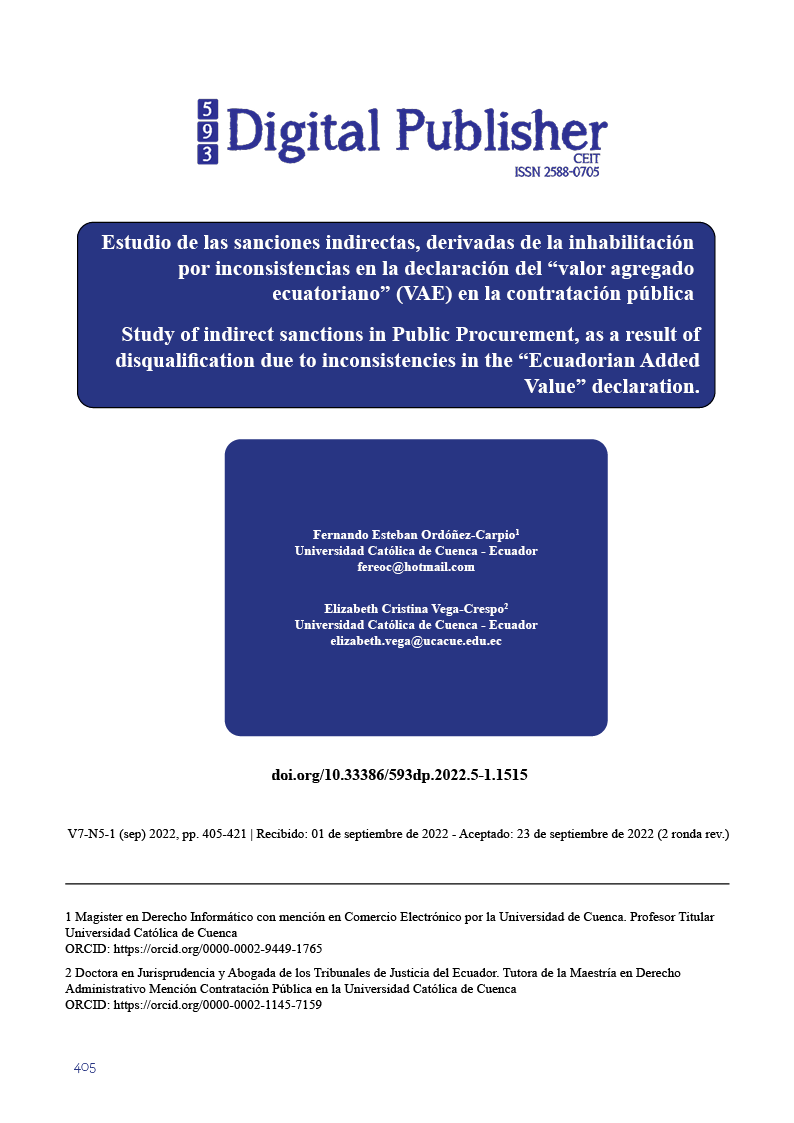Study of indirect sanctions in Public Procurement, as a result of disqualification due to inconsistencies in the “Ecuadorian Added Value” declaration.
Main Article Content
Abstract
Through the development of this article, this topic will be analyzed: the possible judicial and administrative actions that would have at their disposal the suppliers of the State, which have been sanctioned by the SERCOP (National Service of Public Procurement), with the suspension in the RUP (Single Registry of Suppliers), for having provided information or made an erroneous declaration with regard to its status as a domestic producer, within a public procurement procedure; but that, notwithstanding the application of that penalty and, precisely because of it, being blocked in the Public Procurement Portal, they are prevented from complying with obligations previously contracted, as in the case of the signing of contracts awarded in other public procurement processes, prior to taxation of the aforementioned sanction; and, as a result, are subject to a significantly higher penalty for a forced event that does not derive from their responsibility. The mechanisms to be used to achieve their rehabilitation in the National Public Procurement System, as well as compensation for damages unjustly caused will be outlined
Downloads
Article Details

This work is licensed under a Creative Commons Attribution-NonCommercial-ShareAlike 4.0 International License.
1. Derechos de autor
Las obras que se publican en 593 Digital Publisher CEIT están sujetas a los siguientes términos:
1.1. 593 Digital Publisher CEIT, conserva los derechos patrimoniales (copyright) de las obras publicadas, favorece y permite la reutilización de las mismas bajo la licencia Licencia Creative Commons 4.0 de Reconocimiento-NoComercial-CompartirIgual 4.0, por lo cual se pueden copiar, usar, difundir, transmitir y exponer públicamente, siempre que:
1.1.a. Se cite la autoría y fuente original de su publicación (revista, editorial, URL).
1.1.b. No se usen para fines comerciales u onerosos.
1.1.c. Se mencione la existencia y especificaciones de esta licencia de uso.
References
Asamblea Nacional Constituyente. (2008). Constitución de la República del Ecuador. Montecristi, Ecuador: Registro Oficial 449 de 20 de octubre de 2008.
Asamblea Nacional del Ecuador. (2017). Código Orgánico Administrativo. Quito,
Ecuador: Registro Oficial 31 de 7de julio de 2017.
Asamblea Nacional del Ecuador. (2008) Ley Orgánica del Sistema Nacional de Contratación Pública. Quito Ecuador: Registro Oficial 395 de 4 de agosto de 2008.
Asamblea Nacional del Ecuador. (2009) Reglamento General a la Ley Orgánica del Sistema Nacional de Contratación Pública. Quito Ecuador: Registro Oficial 588 de 12 de mayo de 2009.
Balbín C. (2013). Manual de Derecho Administrativo. Ed 2ª. Buenos Aires: Editorial La Ley.
Cassagne, J. (2010). Derecho Administrativo. Lima: Editorial Grández Gráficos S.A.C.
Dromi, R. (2010) Licitación Pública. Ed 4º. Buenos Aires: Editorial Ciudad Argentina.
Dromi, R. (2009). Derecho Administrativo. Ed 12ª. Buenos Aires: Editorial Ciudad Argentina.
García de Enterría E & Fernández T-R. (2008) Curso de Derecho Administrativo. Ed 12ª. Bogotá: Editorial Temis.
Gordillo A. (2003). Tratado de Derecho Administrativo. Ed 7ª. Lima: ARA editores y FDA.
Lopez W. (2011). Tratado de Contratación Pública. Quito: Editorial Jurídica del Ecuador.
Parada R. (2012). Derecho Administrativo. Ed.18ª. Madrid: Editorial Marcial Pons.
Servicio Nacional de Contratación Pública. SERCOP (2016). Resolución SERCOP No. 72-2016, Codificación y Actualización de las Resoluciones Emitidas por el “Servicio Nacional de Contratación Pública”. Quito Ecuador: 31 de agosto de 2016, Ultima modificación 24 de febrero de 2022.
Zavala, J. (2007). Derecho Administrativo. Guayaquil: Editorial Edino.



